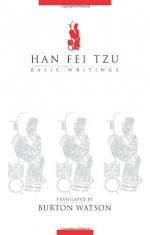|
This section contains 718 words (approx. 3 pages at 300 words per page) |

|
Han Fei, the outstanding authority of the Legalist school of Chinese philosophy during the Warring States Period (403–221 BCE), lived some two centuries or more later than Confucius, Laozi, and Mozi. His works consist of fifty-five treatises. He was an aristocrat of the state of Han, in the northwest, where a movement of political reform had arisen. In the rest of the Chinese kingdom, Confucianism, Mohism, and Daoism still maintained the theory of government by customary morality, religious sanctions, and personal virtuous example or even "inaction" (or "nonaction") by the ruler. Since the traditional feudal system had collapsed generally throughout China, new thinkers spoke of government by positive law, exaltation of the state at the expense of the individual, and possession of supreme power by the ruler. Out of these thoughts of his predecessors, Han Fei made a comprehensive synthesis and...
|
This section contains 718 words (approx. 3 pages at 300 words per page) |

|


